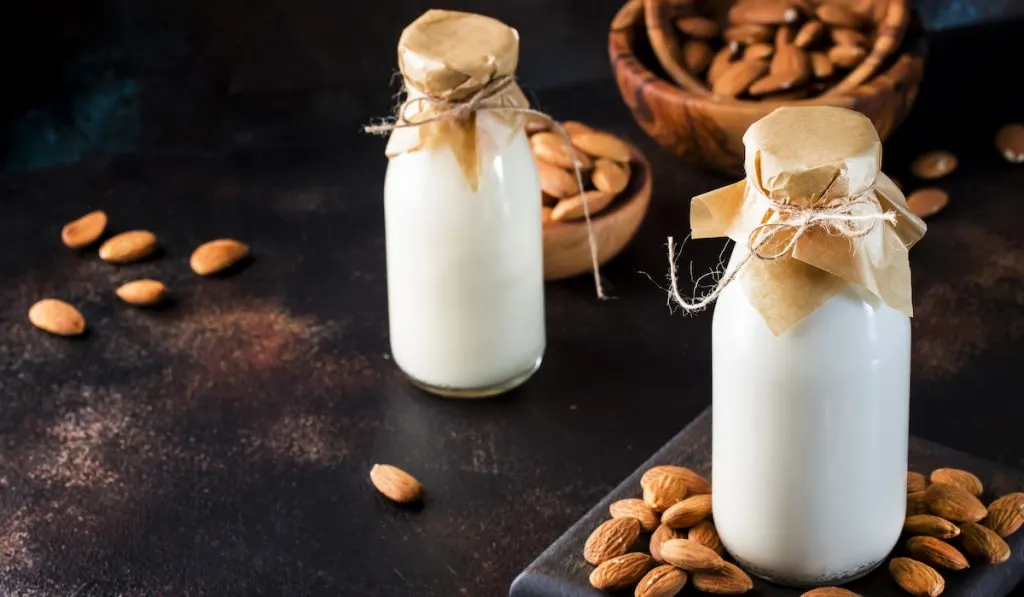Many coffee enthusiasts often tell people not to add anything to their black coffee. Others decide the best way they enjoy their coffee is by adding milk or creamer.
The addition of milk to coffee alters its taste and texture markedly. The fat content of milk makes coffee denser while giving it a velvety texture. Then the proteins soften the bitterness of the coffee.
Milk binds itself to tannins and other polyphenolic elements. While tannins are healthy for you, they have an astringent flavor that can distract you from the coffee’s taste. Milk also helps to reduce the acidity and brightness of coffee.

Most people who drink coffee refer to creamers as coffee whiteners. Creamers are added to coffee to enhance its taste. They are used to replace cream or milk in coffee.
Unlike regular milk, creamers are lactose-free, making them perfect for people who are lactose intolerant. Nonetheless, most creamers contain casein, which is a protein derived from milk.
Creamers are available in a range of flavors, including vanilla, hazelnut, etc. These flavors help to supplement the taste of coffee. Creamers do not need to be refrigerated because they have a longer shelf life than milk.
Some types of creamers pose certain health risks. But for people with health concerns, creamers with low calories and low fat are available.
The subsequent paragraphs of this article will provide the differences between creamer and milk. We will also discuss which is healthier and look at some alternatives to creamers.
What’s the Difference Between Creamer and Milk?
The table below highlights the differences between creamer and milk:
| Creamer | Milk |
| Creamers are produced from non-dairy products such as water, vegetable oils, and sugar. | Milk is usually gotten from cows. However, it may also be derived from plants like almond, rice, oat, coconut, and hemp. |
| Creamers have a high-calorie count per serving. | It has fewer calories per serving when compared to creamers. |
| It is suitable for people who are mostly lactose intolerant. | It can cause severe health problems for people who are lactose intolerant. |
| Consumption of creamer continuously for long periods can result in heart disease and obesity. This is true because many creamers are made with hydrogenated oils. Hydrogenated oils release trans-fat when consumed, and in the long run, trans fat harms the heart. | Relative to creamers, milk is safer to consume and poses minimal health risks. |
Which Is Healthier?
Milk is healthier than creamers. Unlike creamers, milk is unprocessed and contains more minerals and vitamins than creamers.
Most creamers have more calories than milk, with some creamers even containing trans-fats. Taking such creamers frequently can increase a person’s cholesterol level. Besides, if you store creamers for too long, they end up spoiling. This can result in fungal and bacterial infections when consumed.
The ingredients of creamers may often include saturated fats and trans fatty acids. Some creamers also contain large quantities of sugar.
This excess sugar can be harmful to people who are diabetic. Adding such creamers regularly to your coffee can cause various health issues after a while.
When you use creamers, use them in moderation if you want to remain healthy. You should avoid taking creamers in large quantities. A teaspoon or two added to your coffee is more than adequate.
Which Is Better for Weight Loss?
Drinking coffee on its own is enough to help you lose weight. In fact, you can add it to your weight loss plan. However, when you add milk to your coffee, things will turn out differently. Having milk with your coffee may promote weight gain.
Taking creamers with your coffee regularly without being mindful may lead to weight gain. A cup of regular black coffee usually contains less than five calories. Adding creamers with a high-fat content will increase the calories in your coffee and will eventually lead to weight gain.
Adding both milk and creamers to coffee, which is already low in calories, can lead to weight gain. However, some milk types like skim milk, coconut milk, and hemp milk are low in calories and do not promote weight gain.

Whole Milk vs. Creamer
Whole milk is cow’s milk that retains most of its fat content. It typically contains fewer calories and fat than creamers in one serving.
Compared to creamers, whole milk contains more saturated fat. But creamers contain more sugar per serving than whole milk. The sugar content of creamers makes them relatively less healthy than whole milk.
Previous studies have shown that the saturated fat in whole milk can raise your cholesterol level. The risk of getting heart disease becomes a lot higher. As a result of this, whole milk was regarded as unhealthy in the past.
It was also thought that whole milk contributed to weight gain. But recent studies have shown that it does not.
Skim Milk vs. Creamer
Skim milk is a low-fat, low-calorie version of whole milk. The fat content of skim milk which is about 0.5 percent (0.3g) per glass, is lower than that of creamer.
The cholesterol content of skim milk is also lower than that of coffee creamer. This makes it suitable for people looking to reduce their cholesterol consumption. It is also great for people interested in maintaining healthy levels of cholesterol.
The low-fat content of skim milk also makes it beneficial for cardiovascular health.
Skim milk also has fewer calories than creamer, making it the perfect choice for anyone trying to manage their weight.
Creamer contains fewer vitamins and minerals than skim milk. Some of the vitamins in skim milk include vitamin B12, vitamin A, the antioxidant selenium, calcium, and phosphorus.

Can You Use Almond or Coconut Milk Instead of Creamer?
Yes, you can use almond or coconut milk for your coffee instead of creamers. These substitutes are for those looking to reduce how much creamer they take with their coffee for health reasons. It is also perfect for people looking to reduce the consumption of sugar and calories offered by creamers.
Almond milk is a non-dairy milk substitute that you can easily find in your grocery store. However, there are some flavored variations of almond milk, so watch out for the sweeteners or added sugars.
When added to hot coffee, almond milk tends to curdle. To attain the best result, coffee experts recommend that you buy quality almond milk.
People with nut allergies should not use almond milk or any other nut-related milk.
Coconut milk is another non-dairy creamer substitute you can add to your coffee. When added to coffee, it has a similar texture to creamer, excluding all the additives. Like almond milk, coconut milk is a perfect substitute for people who are lactose intolerant.
Coconut milk is becoming quite popular as a substitute for the traditional coffee creamer. Like oat milk and almond milk, it is dairy-free. This makes it appealing to vegans. Coconut milk is also appealing to keto dieters because of its high-fat content.
Before you add coconut milk to your coffee, ensure you like the taste of coconut. The coconut flavor can be divisive, so you should only use coconut milk as a creamer substitute if you are a fan of coconut. Coffee experts also recommend using coconut milk of the highest quality rather than using light processed versions.
Final Take
Milk and creamers should be used in moderation when added to coffee. Using them in excess can cause health risks. In place of dairy milk and creamers, healthier alternatives like almond milk and coconut milk are available. These alternatives offer fewer risks and more benefits, albeit their taste may not be what you desire.
Resources
- https://www.wideopeneats.com/coffee-creamer-substitute/
- https://tastessence.com/coffee-creamer-substitute
- https://coffeecherish.com/powdered-milk-vs-coffee-creamer/
- https://www.searanchlodge.com/best-coffee-creamer-for-weight-loss/
- https://blogs.ext.vt.edu/eatsmart-movemore/2013/10/18/half-and-half-vs-non-dairy-creamer-whats-the-best-for-coffee/
- https://www.healthspan.co.uk/advice/the-benefits-of-skimmed-milk#
- https://integrisok.com/resources/on-your-health/2019/january/what-you-need-to-know-about-milk
- https://jayarrcoffee.com/blogs/news/coffee-creamer/
